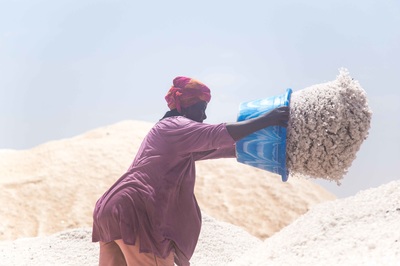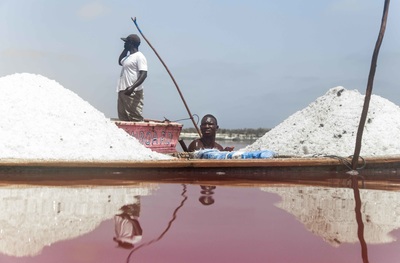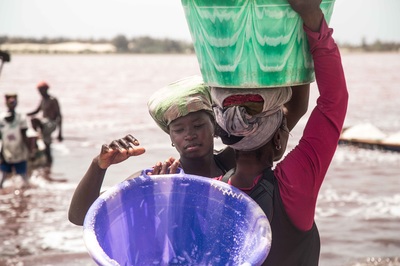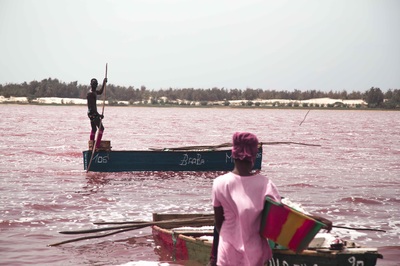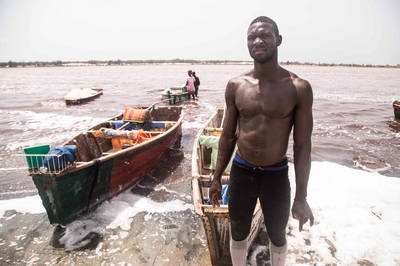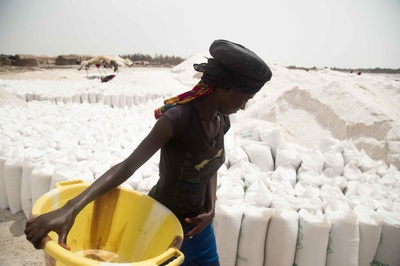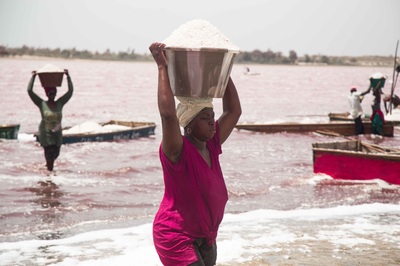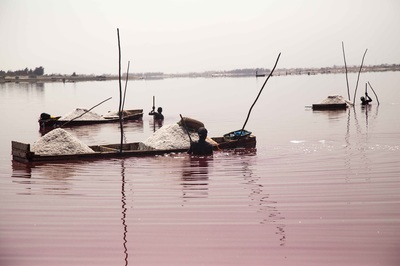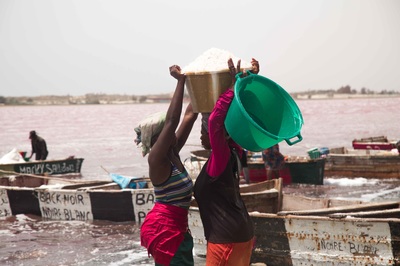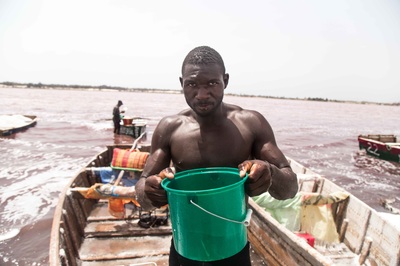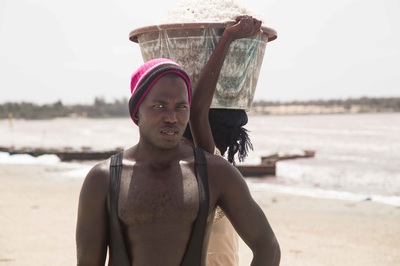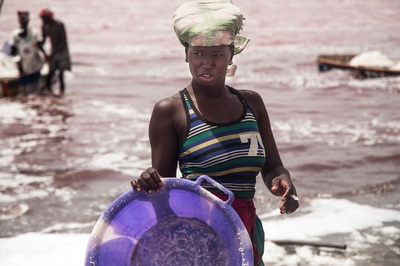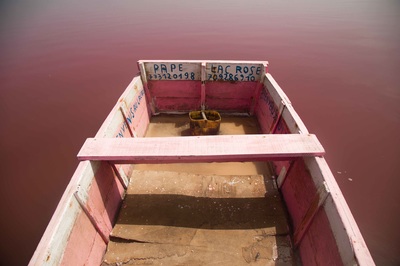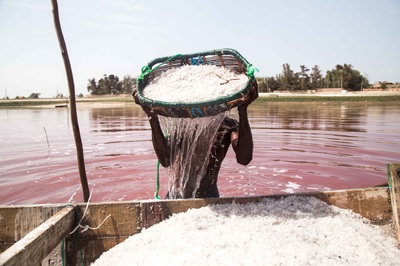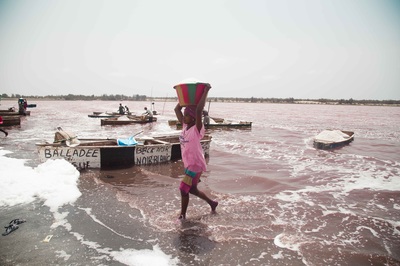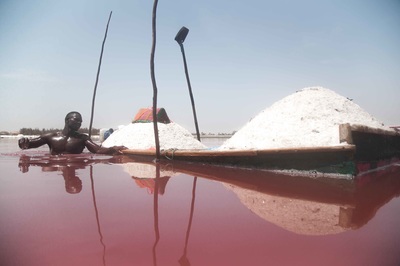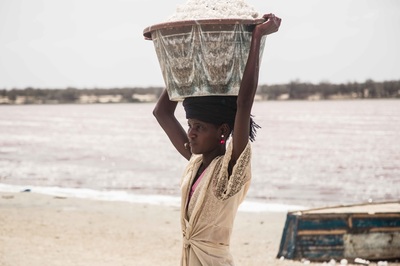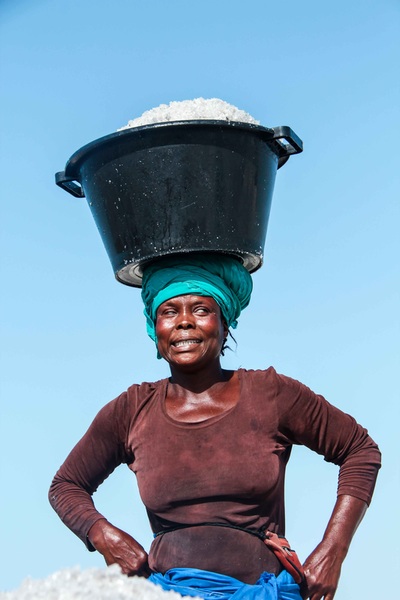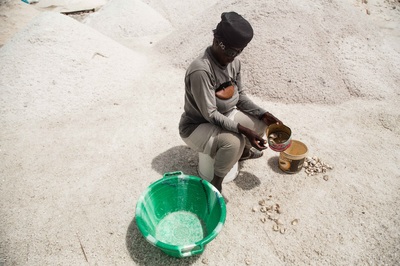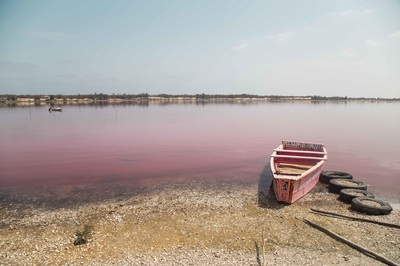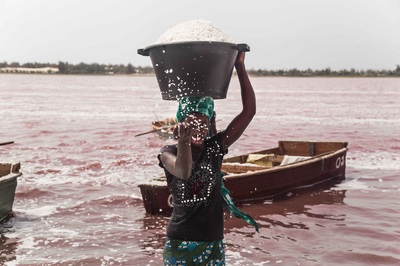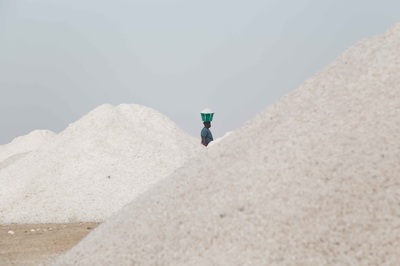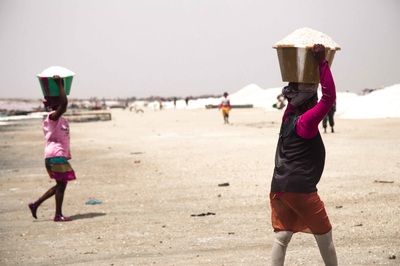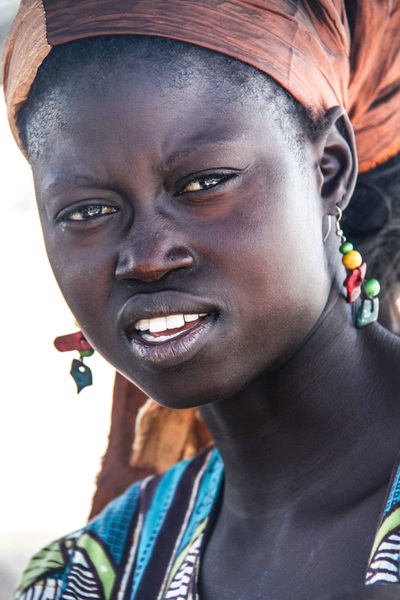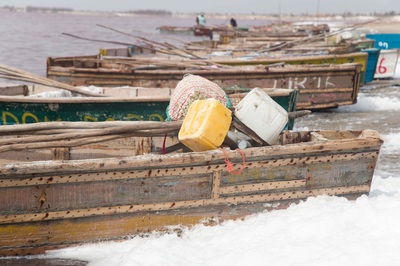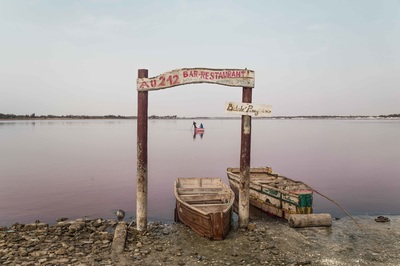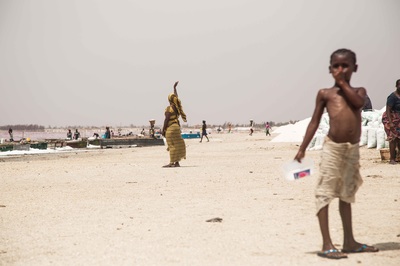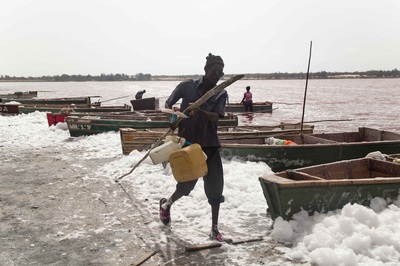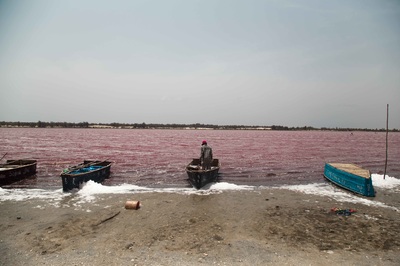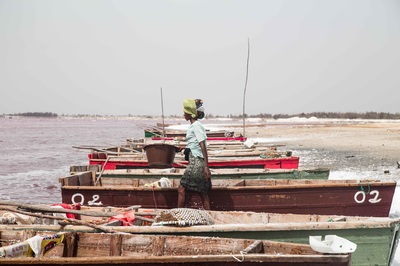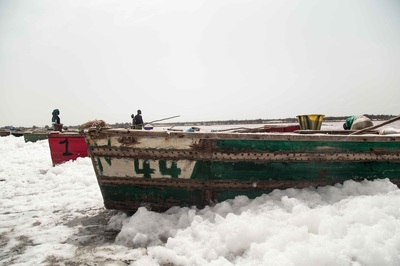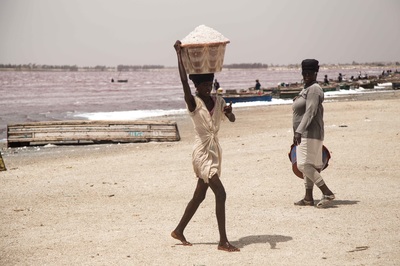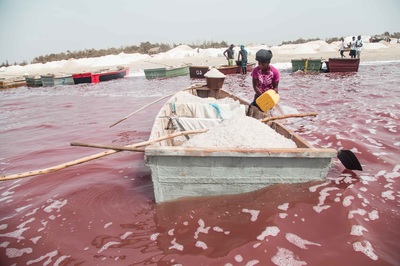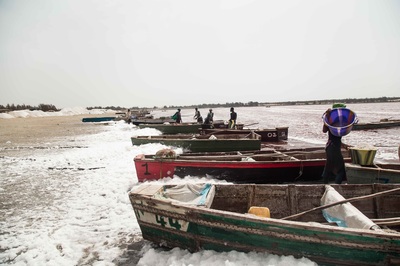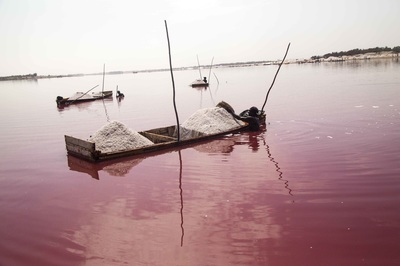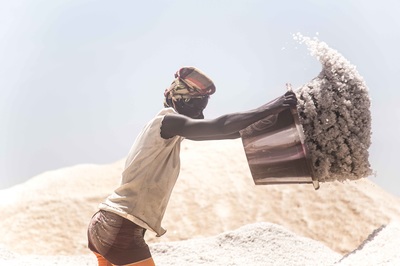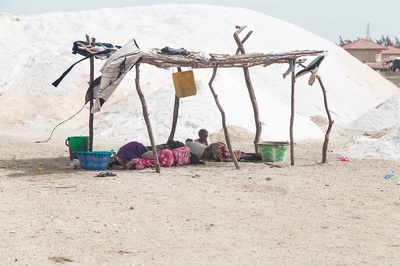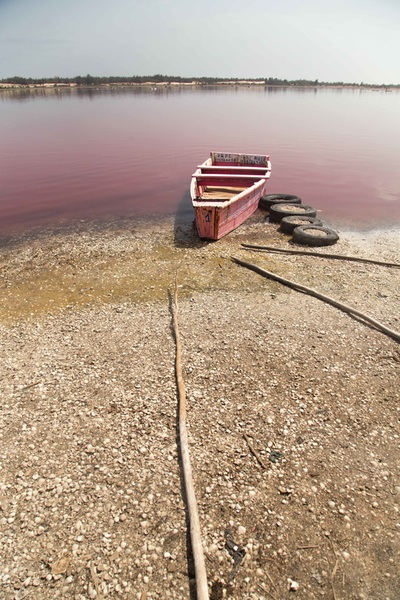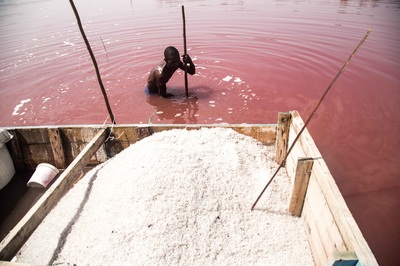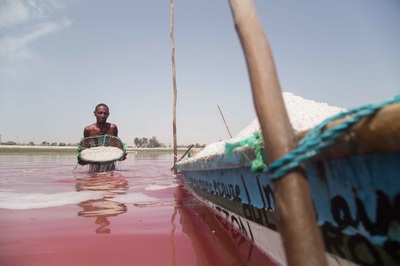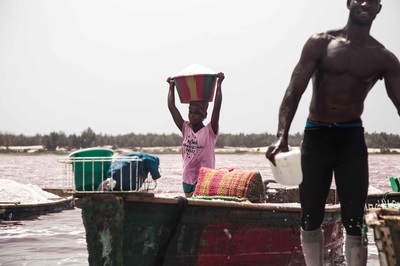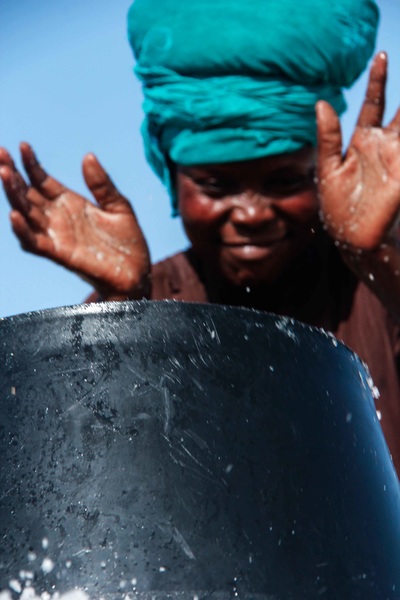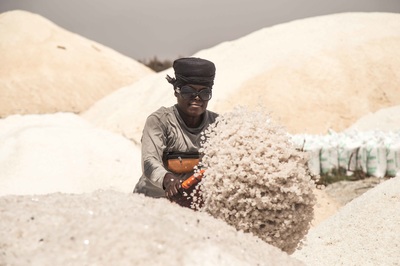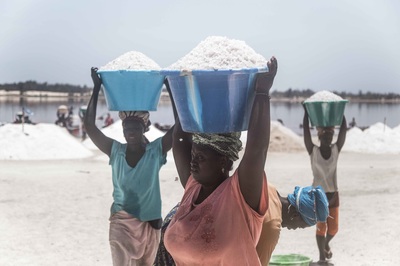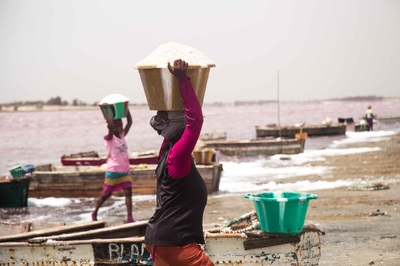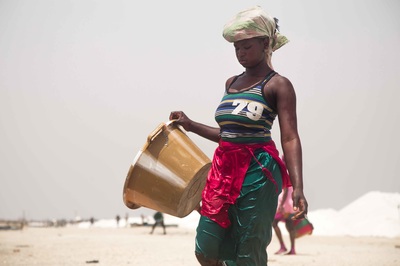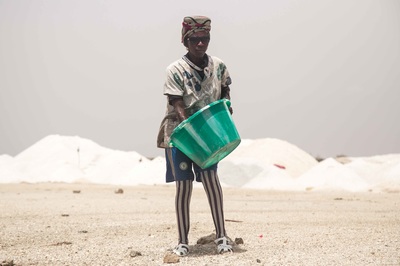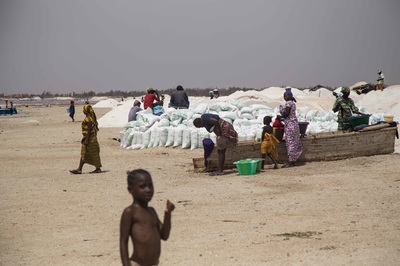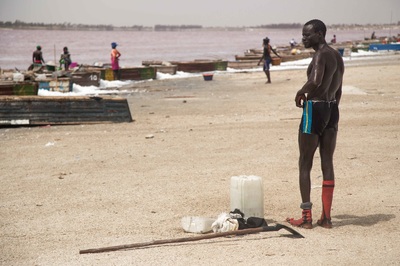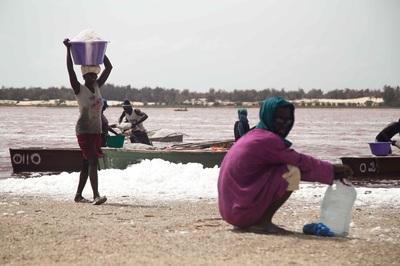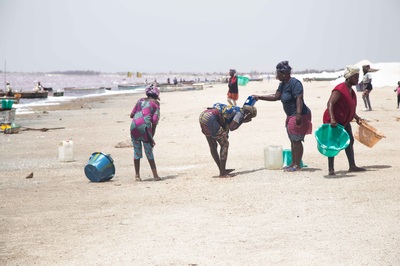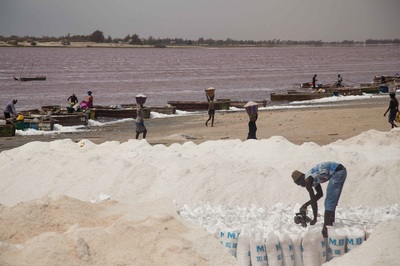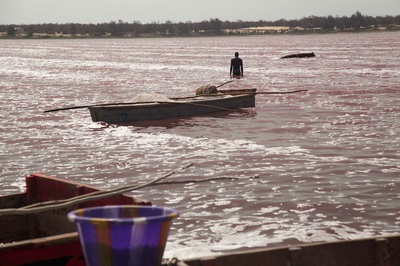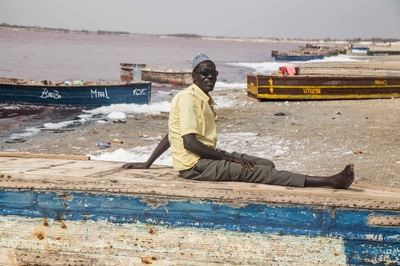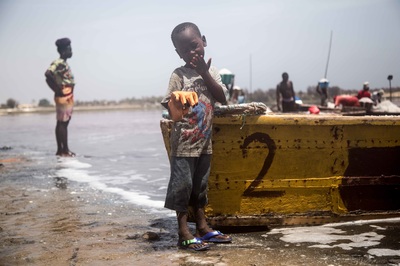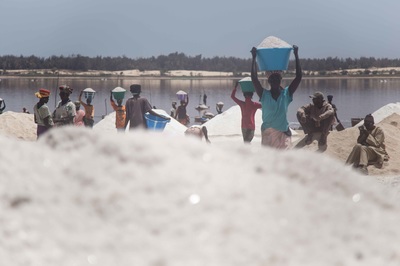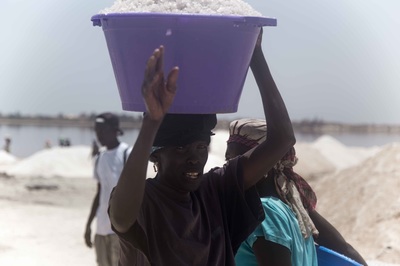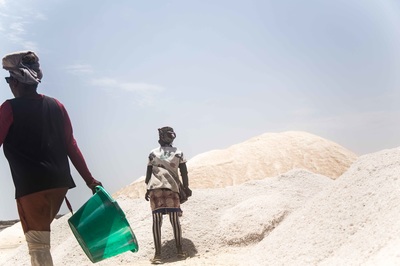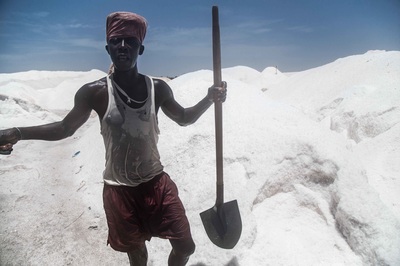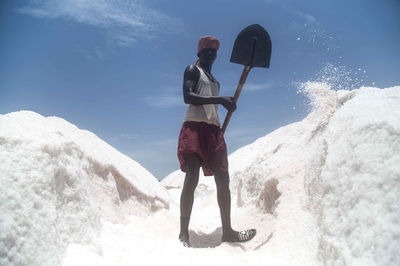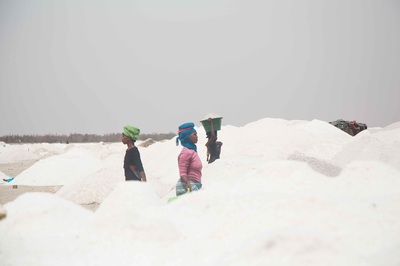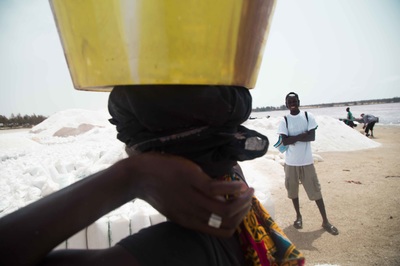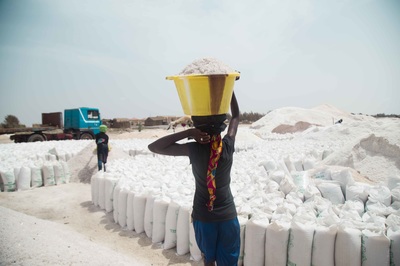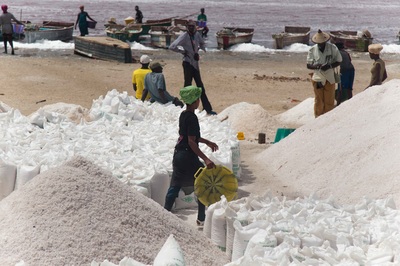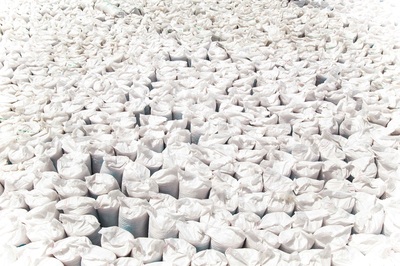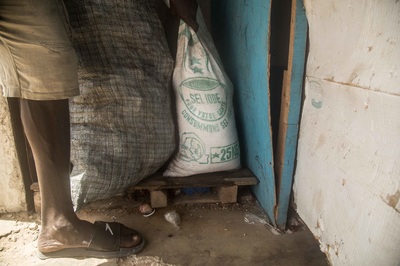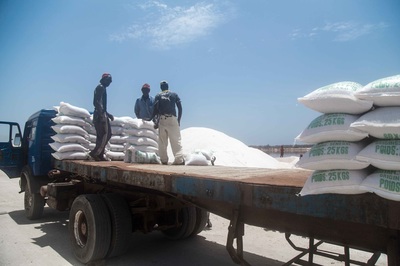Woman of Salt
Lake Retba in Senegal is most commonly known for its unofficial name, the Pink Lake – which long marked the finishing point of the mythical Dakar rally. The dramatic contrast between Senegal’s deep blue skies against the lake’s bright, strawberry pink color has turned this body of water into one of the most stunning natural wonders in the world – and a sight that many tourists want to behold.
With an average salt concentration of 380 grams per liter of water (exceeding 40% salinity in some parts of the lake), the salinity of this now popular tourist attraction is exactly what gives the lake its Pepto-Bismol pink hue: a particular type of pink algae, dunaliella salina, thrives in its waters. The Pink Lake is far more than just a stop in many travelers’ itineraries: it is the largest salt flat in Senegal and among the most important in northeastern Africa. More than 45,000 tons of high-quality salt are extracted every year, then processed and exported as iodized salt.
For the hard-working salt harvesters who are beckoned to its shores by the promise of white gold, salt is both a blessing and a curse. Although just three meters deep and three square kilometers, harvesting salt from these shallow waters requires a considerable amount of human endeavor – from no less than 5,000 souls who reap the lake's bounty. Most of these workers are poorly paid and engage in heavy manual labor, yet they still flock to the lake every single day from dawn till dusk. Men and women can be seen respectively shoveling and carrying enormous quantities of salt, while tourists stroll about staring at the operation with mild interest and with little more than rucksacks on their back.
A good many of these salt-harvesters are also migrant laborers from neighboring countries such as Guinea, Guinea Bissau, the Gambia and the Ivory Coast. The fruit of their unregulated labor is later shipped back to their homelands to be sold by the large salt producers, who gladly hire them in Senegal as they are less reluctant to accept the poor working conditions imposed by the unregulated labor market that is flourishing at the Pink Lake's shores.
But there is far more than meets the eye. Behind these laborious men, are the equally hardworking and –some would say– doubly strong women whose labor is essential to keep the local salt industry running. At first sight, their role might be overlooked since they work exclusively along the shore, either selling salt to tourists or transporting salt to and fro. In reality, their job is not only indispensable, but grueling: they haul the enormous loads of salt that the men bring ashore, carry them down a winding road and deposit their cargo along the swelling salt dunes, where the salt is weighed, iodized and packaged to then be sent abroad.
Salt is everything for those who gather at the shores of the Pink Lake, especially a means of sustenance. Women depend on salt for their livelihoods; through the gendered work it generates, they are able to keep their often large families afloat. And the salt industry, in turn, depends on them. The women of Lake Retba have two jobs to chose from: pace along the shore selling trinkets and vials of salt which is the easier –albeit not as profitable– job, or engage in back-breaking labor.
The female laborers, just like the male ones, are informally employed within the salt industry of Lake Retba – but that is where any traces of gender equality in the workplace stop. Usually the wives, daughters and mothers of the men who extract the salt from the lake, these stalwart women transport kilo after kilo of salt in enormous baskets. For each basket-full they lug to the dunes, they receive a seashell from the overseer – this token helps them keep track of their earnings for the day. Each basket-load can weigh up to 25 kilos and the pay per basket amounts to 150 CFA francs (about US$0.25, i.e. US$0.01 per kilo). Meanwhile, the men make almost US$10 per boat-full of salt collected, whereas the women who pace back and forth from the lake carrying heavy loads of salt, earn barely the same amount for a full day’s worth of work.
The women of salt never stop working. They still do most of the heavy-lifting, in more ways than one. When their long, grueling shifts under the scorching sun are over, more work awaits at home. Senegalese society is still very traditional, and women –even those who work– are still expected to perform housekeeping duties and raise the children. Senegalese women have always been responsible for carrying things along, from jugs of water, baskets of food and babies carefully weighed on their strong bodies, to a full-time job and a family life that weigh heavily upon their psyche.
The working day starts at dawn, and ends with the sunset. Although men can frequently be seen taking breaks throughout their work day and even enjoy downtime at home, the women of the lake are unstoppable bastions of diligence; they perform hard labor under strenuous conditions, often with babies wrapped firmly around their powerful bodies and with several other children in tow, never to be seen catching their breath. The toughest month of all is not the peak of summer, but that of Ramadan: the ninth month of the Islamic calendar, which consists on a month-long fast to commemorate the first revelation of the Quran to Muhammad. The Senegalese are predominantly Muslim and as practicing devotees they uphold many of the more conservative traditions and rules, including those which create gender disparities: even today, men may have four wives while women are only permitted one husband. During the holy month of Ramadan, the men and women who already work under the sun hauling enormous loads of salt, must continue to do so without food or water. According to conservative interpretations of the Quran, they can only eat in evening, once the sun sets.
Tourists, the quiet bystanders who witness abusive labor conditions without their knowledge, have inadvertently done something positive to help the local community. By flocking to these shores, they have boosted the creation of a parallel black market that helps laborers earn some extra income. The salt harvesters typically offer tourists rides on their pirogues in exchange for a few francs – some might get bold and even charge for pictures. The women, on the other hand, roam the shores selling salt-related memorabilia to the thousands of tourists who visit the lake every year.
At 21 years old, Aicha is one of these women. She’s been selling souvenirs to tourists since she was 15 years old, so she really noticed the downturn in business when the ebola epidemic hit Africa, she says. Although Senegal wasn’t directly affected by the epidemic, the spread of ebola still produced an adverse effect on the tourism industry throughout the entire African continent.
Aicha adds that she worked transporting salt in the past, "We had to work every single day under the harsh sun, covered in salt from head to toe, lugging hundreds of kilos of salt. At least now I can enjoy sitting in the shade a bit more often,” she said, referring to her new job selling salt trinkets and handicrafts.
Nevertheless, salt is just as much the livelihood as the downfall of these workers. All laborers are equally exposed to the harmful effects of salinity on a regular basis. Without adequate protection, such as slathering a layer of shea butter on before stepping into the water, Lake Retba's salinity can burn through your skin. Even with protection, long-term exposure to high-salinity waters is not advised – yet most workers have had no choice but to spend decades drenched in a fine layer of salt, courtesy of laboring along the shores of the Pink Lake.
At the same time, iodine deficiency has been an endemic health issue throughout the region; one that has been linked to the development of several disorders. Namely, iodine deficiency during pregnancy can impair fetal brain development and increase the risk of infant mortality. It has also been shown to affect the cognitive abilities and school performance of children, explains the United Nations Children's Fund.
The recent rise in popularity that iodized salt has enjoyed throughout the African continent was partly due to an awareness-raising campaign that promoted the health benefits of consuming iodized salt. It was carried out by the World Food Program and the World Health Organization – who also fund salt-iodization programs in Western Africa. An estimated 70% of the salt processed is destined for the very West African countries many of these workers hail from: Mali, Nigeria, Gambia, Ivory Coast, Mauritania – while the remainder travels further still, towards France, Italy, Spain, Germany, the USA and Japan.
Sardonically enough, iodized salt is a luxury for the workers of Lake Retba that they cannot afford: it cannot even be found in the tiny supermarkets that dot the village in the immediate vicinity of the Pink Lake where most of these laborers live. Their job is to work tirelessly day and day out, to ensure other families get to enjoy the positive effects of iodized salt while all they are left with is the burns from collecting and transporting the raw salt under the scorching sun. Meanwhile, their children spend their short childhoods following in their parents’ footsteps. Today they play in the salt, the same salt that helps put food on their table once their mothers’ shift ends at sunset. But as soon as their little arms and backs can withstand the weight of salt, they are destined to be consumed by it too.
Text in collaboration with Carla McKirdy.
http://www.barcroft.tv/salt-harvesters-pink-lake-senegal-africa
Lake Retba in Senegal is most commonly known for its unofficial name, the Pink Lake – which long marked the finishing point of the mythical Dakar rally. The dramatic contrast between Senegal’s deep blue skies against the lake’s bright, strawberry pink color has turned this body of water into one of the most stunning natural wonders in the world – and a sight that many tourists want to behold.
With an average salt concentration of 380 grams per liter of water (exceeding 40% salinity in some parts of the lake), the salinity of this now popular tourist attraction is exactly what gives the lake its Pepto-Bismol pink hue: a particular type of pink algae, dunaliella salina, thrives in its waters. The Pink Lake is far more than just a stop in many travelers’ itineraries: it is the largest salt flat in Senegal and among the most important in northeastern Africa. More than 45,000 tons of high-quality salt are extracted every year, then processed and exported as iodized salt.
For the hard-working salt harvesters who are beckoned to its shores by the promise of white gold, salt is both a blessing and a curse. Although just three meters deep and three square kilometers, harvesting salt from these shallow waters requires a considerable amount of human endeavor – from no less than 5,000 souls who reap the lake's bounty. Most of these workers are poorly paid and engage in heavy manual labor, yet they still flock to the lake every single day from dawn till dusk. Men and women can be seen respectively shoveling and carrying enormous quantities of salt, while tourists stroll about staring at the operation with mild interest and with little more than rucksacks on their back.
A good many of these salt-harvesters are also migrant laborers from neighboring countries such as Guinea, Guinea Bissau, the Gambia and the Ivory Coast. The fruit of their unregulated labor is later shipped back to their homelands to be sold by the large salt producers, who gladly hire them in Senegal as they are less reluctant to accept the poor working conditions imposed by the unregulated labor market that is flourishing at the Pink Lake's shores.
But there is far more than meets the eye. Behind these laborious men, are the equally hardworking and –some would say– doubly strong women whose labor is essential to keep the local salt industry running. At first sight, their role might be overlooked since they work exclusively along the shore, either selling salt to tourists or transporting salt to and fro. In reality, their job is not only indispensable, but grueling: they haul the enormous loads of salt that the men bring ashore, carry them down a winding road and deposit their cargo along the swelling salt dunes, where the salt is weighed, iodized and packaged to then be sent abroad.
Salt is everything for those who gather at the shores of the Pink Lake, especially a means of sustenance. Women depend on salt for their livelihoods; through the gendered work it generates, they are able to keep their often large families afloat. And the salt industry, in turn, depends on them. The women of Lake Retba have two jobs to chose from: pace along the shore selling trinkets and vials of salt which is the easier –albeit not as profitable– job, or engage in back-breaking labor.
The female laborers, just like the male ones, are informally employed within the salt industry of Lake Retba – but that is where any traces of gender equality in the workplace stop. Usually the wives, daughters and mothers of the men who extract the salt from the lake, these stalwart women transport kilo after kilo of salt in enormous baskets. For each basket-full they lug to the dunes, they receive a seashell from the overseer – this token helps them keep track of their earnings for the day. Each basket-load can weigh up to 25 kilos and the pay per basket amounts to 150 CFA francs (about US$0.25, i.e. US$0.01 per kilo). Meanwhile, the men make almost US$10 per boat-full of salt collected, whereas the women who pace back and forth from the lake carrying heavy loads of salt, earn barely the same amount for a full day’s worth of work.
The women of salt never stop working. They still do most of the heavy-lifting, in more ways than one. When their long, grueling shifts under the scorching sun are over, more work awaits at home. Senegalese society is still very traditional, and women –even those who work– are still expected to perform housekeeping duties and raise the children. Senegalese women have always been responsible for carrying things along, from jugs of water, baskets of food and babies carefully weighed on their strong bodies, to a full-time job and a family life that weigh heavily upon their psyche.
The working day starts at dawn, and ends with the sunset. Although men can frequently be seen taking breaks throughout their work day and even enjoy downtime at home, the women of the lake are unstoppable bastions of diligence; they perform hard labor under strenuous conditions, often with babies wrapped firmly around their powerful bodies and with several other children in tow, never to be seen catching their breath. The toughest month of all is not the peak of summer, but that of Ramadan: the ninth month of the Islamic calendar, which consists on a month-long fast to commemorate the first revelation of the Quran to Muhammad. The Senegalese are predominantly Muslim and as practicing devotees they uphold many of the more conservative traditions and rules, including those which create gender disparities: even today, men may have four wives while women are only permitted one husband. During the holy month of Ramadan, the men and women who already work under the sun hauling enormous loads of salt, must continue to do so without food or water. According to conservative interpretations of the Quran, they can only eat in evening, once the sun sets.
Tourists, the quiet bystanders who witness abusive labor conditions without their knowledge, have inadvertently done something positive to help the local community. By flocking to these shores, they have boosted the creation of a parallel black market that helps laborers earn some extra income. The salt harvesters typically offer tourists rides on their pirogues in exchange for a few francs – some might get bold and even charge for pictures. The women, on the other hand, roam the shores selling salt-related memorabilia to the thousands of tourists who visit the lake every year.
At 21 years old, Aicha is one of these women. She’s been selling souvenirs to tourists since she was 15 years old, so she really noticed the downturn in business when the ebola epidemic hit Africa, she says. Although Senegal wasn’t directly affected by the epidemic, the spread of ebola still produced an adverse effect on the tourism industry throughout the entire African continent.
Aicha adds that she worked transporting salt in the past, "We had to work every single day under the harsh sun, covered in salt from head to toe, lugging hundreds of kilos of salt. At least now I can enjoy sitting in the shade a bit more often,” she said, referring to her new job selling salt trinkets and handicrafts.
Nevertheless, salt is just as much the livelihood as the downfall of these workers. All laborers are equally exposed to the harmful effects of salinity on a regular basis. Without adequate protection, such as slathering a layer of shea butter on before stepping into the water, Lake Retba's salinity can burn through your skin. Even with protection, long-term exposure to high-salinity waters is not advised – yet most workers have had no choice but to spend decades drenched in a fine layer of salt, courtesy of laboring along the shores of the Pink Lake.
At the same time, iodine deficiency has been an endemic health issue throughout the region; one that has been linked to the development of several disorders. Namely, iodine deficiency during pregnancy can impair fetal brain development and increase the risk of infant mortality. It has also been shown to affect the cognitive abilities and school performance of children, explains the United Nations Children's Fund.
The recent rise in popularity that iodized salt has enjoyed throughout the African continent was partly due to an awareness-raising campaign that promoted the health benefits of consuming iodized salt. It was carried out by the World Food Program and the World Health Organization – who also fund salt-iodization programs in Western Africa. An estimated 70% of the salt processed is destined for the very West African countries many of these workers hail from: Mali, Nigeria, Gambia, Ivory Coast, Mauritania – while the remainder travels further still, towards France, Italy, Spain, Germany, the USA and Japan.
Sardonically enough, iodized salt is a luxury for the workers of Lake Retba that they cannot afford: it cannot even be found in the tiny supermarkets that dot the village in the immediate vicinity of the Pink Lake where most of these laborers live. Their job is to work tirelessly day and day out, to ensure other families get to enjoy the positive effects of iodized salt while all they are left with is the burns from collecting and transporting the raw salt under the scorching sun. Meanwhile, their children spend their short childhoods following in their parents’ footsteps. Today they play in the salt, the same salt that helps put food on their table once their mothers’ shift ends at sunset. But as soon as their little arms and backs can withstand the weight of salt, they are destined to be consumed by it too.
Text in collaboration with Carla McKirdy.
http://www.barcroft.tv/salt-harvesters-pink-lake-senegal-africa
© Sebastian Gil Miranda Photography - All rights reserved
